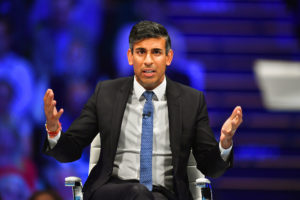If you are Conservative-curious, or simply have a taste for the absurd, there is a good chance that your Christmas stocking included the recent Liz Truss biography, Out of the Blue. Announced in late September, the book was meant to chronicle the new Prime Minister’s “astonishing rise to power” and “plans for Britain’s future”. By the time it was published, barely two months later, it had become an obituary to her “rapid fall” and “self-implosion“. Its authors, Harry Cole and James Heale, found themselves competing for custom with an alternative volume, entitled Liz Truss: Her Greatest Accomplishments as Prime Minister. It consisted of an entirely blank notepad.
The Truss premiership crowned perhaps the most chaotic year in Conservative history: a year of three Prime Ministers, four Chancellors of the Exchequer, three Home Secretaries, four Health Secretaries and five Education Secretaries. Ministers cascaded through government like some dystopian vision of the Twelve Days of Christmas. That some of them were the same people, winking in and out of office like a faulty dash light, added to the sense of drawing-room farce. It was the year of Partygate, Pinchergate and Tractorporn, in which one prime minister was “ambushed by a cake” and another mugged by the financial markets; a year in which, as a Victorian Home Secretary lamented, “the crisis of one day is obliterated by the catastrophe of the next”.
Like a former government advisor, furtively editing his Wikipedia page, it would be understandable if Conservatives preferred simply to erase 2022 from the historical record. Yet if the Conservative Party is to dig itself out of the hole in which it is currently floundering, it needs a better understanding of the mistakes that landed it there. In particular, it needs to recognise that the Truss debacle was not some aberration from the party’s recent history, but the culmination of its most destructive tendencies.
Truss did not fall into No. 10 from a spaceship, like some twin-set Mr Bean. She won the leadership because she best expressed what Conservatism has become. The attributes that broke her premiership were also those that carried her into power, making her the favoured candidate of the party membership, the Right-wing think-tanks that supplied so much of her programme, and what the political scientist Tim Bale calls “the party in the press”: the network of sympathetic newspapers that works to maintain the party in office. Sold as the heir to Margaret Thatcher, Truss was to prove more Tin Lizzie than Iron Lady; but her ill-fated premiership was more a symptom of her party’s problems than their cause.
Truss was cheered into office by the party’s most loyal newspapers, which trashed her critics, lauded her tax cuts and only turned on her when it became obvious she could not survive. Headlines proclaimed “In Liz We Trust”. “Cometh the Hour, Cometh the Woman”; and “Liz Puts Her Foot on the Gas”. The reaction to the mini-budget was equally effusive. “At Last”, gushed the Daily Mail, “a True Tory Budget”. A Daily Telegraph front page called it “the best Budget I have ever heard a British Chancellor deliver”. For the Express, part of Truss’s allure was “her long involvement with centre-right think tanks”. Responding to the mini-budget, a representative of the Centre for Policy Studies told the IEA podcast that it as “exactly what we would have hoped for”. The Taxpayers’ Alliance called it “the most taxpayer-friendly budget in recent memory”.
Newspapers and think-tanks could provide the mood music, but only MPs and party members could put Truss in No. 10. Her comments on the campaign trail may have alarmed the commentariat — whether dismissing the First Minister of Scotland as an “attention-seeker” to be “ignored”, or refusing to say whether the President of France was “a friend or foe” — but they drew cheers from the party audiences to whom they were delivered. As an aide to the Truss campaign told her biographers, “we went straight for the membership and gave them what they wanted to hear”.
Add in the endorsement of figures such as Daniel Hannan, David Frost, Sajid Javid and Ben Wallace, or the money that cascaded in from party donors, and the Truss premiership begins to look less like the personal failure of a flawed individual, and more like a systemic disaster for which the party bears collective responsibility. The Conservative Party turned to Liz Truss, not in some temporary spasm of irrationality, but because she embraced the ideas and courted the institutions that had become dominant in its make-up. The forces that destroyed her premiership were those that secured it for her in the first place.
Take, for example, Truss’s enthusiasm for “moving fast and breaking things”. Not so long ago, a politician who boasted of being the “disruptor in chief” — who told a journalist that “I embrace the chaos. I’m a thrill-seeker” — might have been thought an unlikely candidate for a “Conservative” party. Her contempt for “orthodoxy” might have puzzled a party that prized tradition, while her conviction that sheer willpower could bulldoze all difficulties would have sat uneasily with a Burkean sense of human fallibility, girding its suspicion of grand visions for change.
Yet these were exactly the attributes that had enthused Truss’s supporters. For her cheerleaders in the media, the case for Truss was precisely that “she gets the need for radical change“; that she was an enthusiast for “elbowing to one side the Treasury’s fiscal conservatism“; that she persistently “knocked aside her critics” and was “ready to take on all opponents”. For the Daily Mail, it was Truss’s “boosterism” that “puts her in the driving seat”. Ignoring civil servants, economists and forecasters came naturally to a party that, in Michael Gove’s famous words, had decided years earlier that “people in this country have had enough of experts”. Why consult the Office for Budget Responsibility, when it had been dismissed by Conservative columnists as “a waste of money” and a “vehicle for establishment groupthink”?
A party that had spent years urging its supporters to “believe in Brexit”; that decried warning voices as “doomsters” and “gloomsters”, guilty of “talking down Britain”; and that blamed setbacks on “saboteurs” and “enemies of the people”, could not have been surprised at a leader who embraced boosterish economics, ignored warning voices and blamed setbacks on a mythical “anti-growth coalition”. Having burned out Remainers and moderates under Johnson, the party could hardly complain when Sunak supporters were informed that “their careers are over. If you’re on the stage you’re in a grave”.
The danger for the Conservative Party is that it turns to one of two comforting myths to explain the Truss debacle. One loads the blame entirely onto Truss, insisting that “the notes were right. It’s just that they were in the wrong order”. The same think-tanks who had hailed Truss’s rise to power now likened her to a “hubristic, or crazy, or incompetent” chef, who had bungled their “perfect and delicious” “recipe“. A second myth blames a “Remainer coup”, driven by the “anti-growth coalition” and “the Remainer elite”; a “very British coup” propelled by a “pushback against democracy”.
The reality is more prosaic. Truss was the product, not the source, of her party’s problems. She embodied a Conservatism that embraced creative destruction, that was dismissive of caution and contemptuous of institutions, that prized ideology over experience and regarded opposing voices as heresies to be burned out; a Conservatism that had ceded power to irresponsible think-tanks, contrarian newspaper columnists and a dwindling party membership that nobody has elected. Truss’s crime was to carry that Molotov Cocktail into government, holding it aloft like a torch; but it was others who mixed the ingredients and lit the fuse. The paradox is that this combustible mix was so often described as “real” or “true” Conservatism; yet that aspiration may offer the beginnings of a road to recovery.
If the Conservative Party is to rebuild itself, it might find inspiration in its own best traditions. It might recognise that institutions are fragile and easily damaged: that the problem with “moving fast and breaking things” is that things of value get broken. It might revive its sense of human fallibility, requiring grand ideological visions to be tested carefully against evidence and experience. It might recognise, as Margaret Thatcher did, that caution is not the enemy of change, but a crucial component of its success.
That will require it to reconsider its taste for disruption, and to wean itself off the influence of what Truss herself famously called “vested interests dressed up as think-tanks”. Like the Labour Party, it may also need to rethink the case for treating the choice of prime minister as a subscriber benefit for its dwindling pool of members. Temperamentally, Sunak seems less inclined to play the “disruptor”; whether he can defy the forces in his party that crave such a role remains to be seen.
In her final speech as Prime Minister, Truss offered a mangled quotation from the Roman philosopher Seneca: “It is not because things are difficult that we do not dare. It is because we do not dare that they are difficult”. It was a bizarre choice for a politician who had just crashed the public finances and destroyed her own premiership, as a result — in her own words — of going “too far and too fast“. If the Conservative Party is to take Seneca as its inspiration, it might be wiser to look to his reflections on Epicurus, who remarked that “A consciousness of wrongdoing is the first step to salvation”. This, Seneca concluded, was a “very good” maxim. “For a person who is not aware that he is doing anything wrong has no desire to be put right. You have to catch yourself doing it before you can reform”.
Disclaimer
Some of the posts we share are controversial and we do not necessarily agree with them in the whole extend. Sometimes we agree with the content or part of it but we do not agree with the narration or language. Nevertheless we find them somehow interesting, valuable and/or informative or we share them, because we strongly believe in freedom of speech, free press and journalism. We strongly encourage you to have a critical approach to all the content, do your own research and analysis to build your own opinion.
We would be glad to have your feedback.
Source: UnHerd Read the original article here: https://unherd.com/




